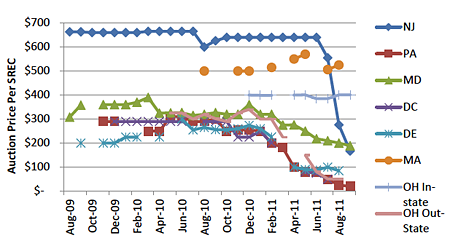SRECTrade’s January 2012 SREC Auction closed last week. Below are the clearing prices by vintage across the markets SRECTrade is currently active in.
| January SREC Prices |
Energy Year Ending |
| State |
2010 |
2011 |
2012* |
| Delaware |
– |
– |
$65.00 |
| Maryland In-State |
– |
$204.99 |
|
| Maryland Out-of-State |
– |
$35.00 |
|
| Massachusetts |
– |
– |
|
| New Jersey |
– |
$245.00 |
$245.00 |
| Ohio In-State |
– |
– |
|
| Ohio Out-of-State |
$30.00 |
$35.00 |
|
| Pennsylvania |
– |
$20.00 |
$29.99 |
| Washington, DC |
$250.00 |
$270.00 |
|
Notes:
*Delaware, New Jersey and Pennsylvania operate on a June-May energy year.
Green text represents a price increase over the last auction clearing price for that vintage, red text represents a decrease.
“-” reflects no sale, which would result if there were no matching bids and offers that cleared for a sale in the auction.
State Market Observations:
Please note, all capacity references are from the latest SRECTrade capacity analysis and reference the amount of supply registered as of the end of December. Additional details regarding SREC issuance are provided in the capacity analysis.
Delaware (Supply: 25.5 MW | Demand: 19.8 MW): Pricing increased slightly this period, trading up to $65.00/SREC. The Delaware PSC approved the SREC Procurement Pilot Program for long term contract solicitations. As of January 3, 2012, PJM GATS reported the issuance of approximately 13,560 DE2011-12 vintage SRECs. Additional SRECs from prior eligible periods may also impact the market should there be a demand for these older vintage SRECs.
Maryland (In-state Supply: 37.8 MW | Demand: 27.6 MW): SRECs declined slightly to $204.99 this past auction period. While not seeing any demand all year long, MD2011 Out-of-State traded at $35/SREC. The state continues on pace to maintain a balanced supply relative to demand for the compliance year. As 2011 compliance obligations are finalized, a shortage of SRECs in the state, if any, will be reflected by an increase in prices at the end of the trading period.
Massachusetts (Operational Supply: 32.5 MW | Demand: 55.7 MW): There was no sale of MA2011 SRECs this period. The next quarterly MA SREC auction will close on Tuesday, January 17, 2012.
New Jersey (Supply: 483.2 MW* | Demand: 368 MW): The 2012 market increased to $245 this auction period. Approximately 15% of the available supply in the auction cleared, representing a gap between buyer and seller’s expectation of value. Oversupply continues to grow as the state has averaged 32.0 MW installed per month since the beginning of the compliance period. October 2011 saw an increase in 41.2 MW. *Note: This figure represents the capacity registered in PJM GATS as of December 2011. Please reference the capacity analysis link above for details on NJ Office of Clean Energy installed capacity figures.
Ohio (In-State Supply: 29.0 MW; Out-of-state Supply: 68.0 MW | Demand: 39.1 MW) : There was no sale of OH2011 sited SRECs. The out-of-state SREC market saw activity, increasing in value from $30/SREC to $35/SREC.
Pennsylvania (Supply: 159.4 MW | Demand 41.2 MW): PA2011 SRECs traded up to $20/SREC and PA2012 increased to $29.99/SREC. HB 1508 will go before the Pennsylvania Commerce Committee this Wednesday, 1/11/12.
Washington, DC (Supply: 21.7 MW | Demand: 41.9 MW): Prices continue to increase as legislation closing the DC market borders and increasing requirements take effect on the market. The 2010 vintage cleared at $255.16/SREC, while the 2011 vintage cleared at $270/SREC. Note, the SREC and capacity figures do not take into consideration the amount of electricity delivered into the district that may be exempt from complying with the Distributed Generation Amendment Act increases, considering some electricity contracts may have been signed prior to the amendment’s implementation
For historical pricing please see this link. The next SRECTrade auction covering Q3 MA2011 generation closes on Tuesday, January 17 at 5 p.m. ET. The following auction covering all markets closes on Tuesday, January 31 at 5 p.m. ET.



